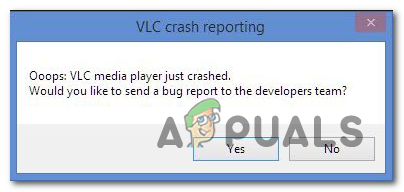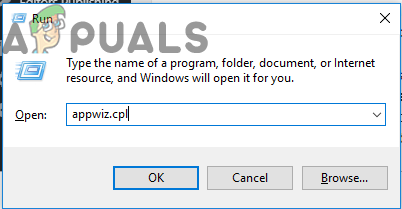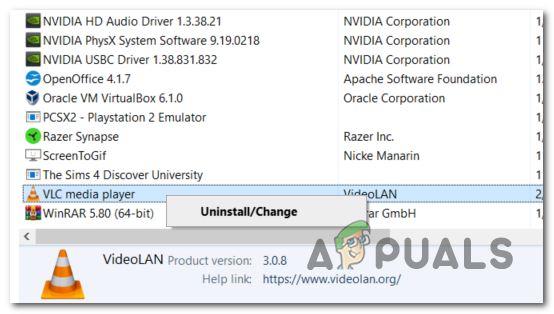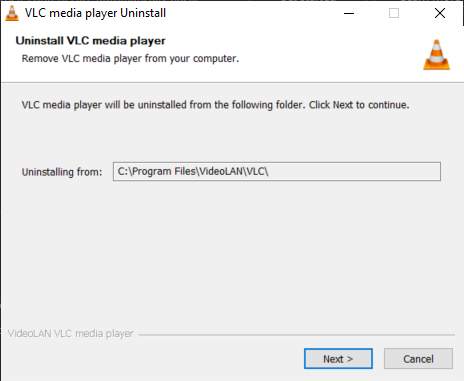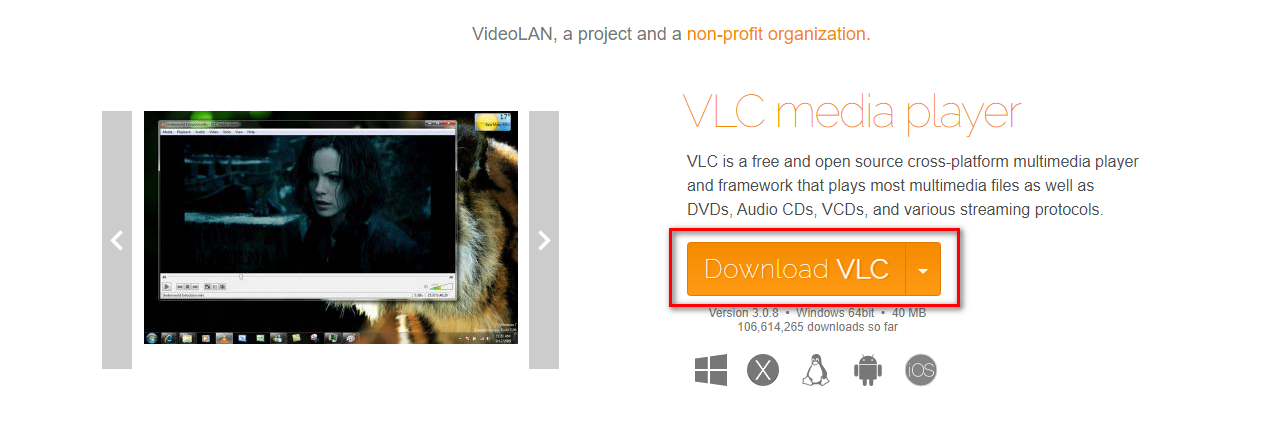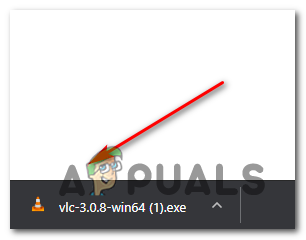If you’re using an ancient version of VLC Media Player (the build is dated around 2012), the issue can most likely be fixed by uninstalling your current VLC version and migration towards the most recent release. However, if you are encountering a period of lagging and skipping before your VLC player finally crashes, it’s possible that insufficient processing power is causing the ‘Oops: VLC media player just crashed’ error. In this case, you should try disabling hardware acceleration decoding, switching to DirectX video acceleration or boosting the default file caching value. In case your machine should be more than capable of playing 4K .MKV files, you should also try forcing the application to skip the loop filter or even enable multi-thread decoding on FFmpeg playback for .MKV files.
Method 1: Installing the latest version of VLC Media Player
As it turns out, one of the most common causes that will cause this particular error when playing .MKV files with VLC Media Player is a bug that used to affect VLC versions released around 2012. If you’re using a severely outdated VLC client, the fix might be as simple as uninstalling your current version of VLC and installing the latest build from the official website. Note: Keep in mind that the auto-updating feature on VLC is known to break quite often. So don’t dismiss this potential fix just because you haven’t been prompted to update by the application. several affected users have confirmed that uninstalling their current VLC version via the Programs and Files menus and installing the latest build from the official download page has finally allowed them to fix the ‘Oops: VLC media player just crashed’ error’. Here are step by step instructions through the whole thing: In the event that you’re still struggling with frequent ‘Oops: VLC media player just crashed’ crashes when attempting to play .MKV files, move down to the potential fix below.
Method 2: Disable Hardware acceleration decoding
In case you’re only encountering skipping issues or general crashes on VLC when you attempt to play high-definition .MKV files by streaming them over a network, it’s most likely due to insufficient processing power on your computer. This issue has been encountered by other users facing the problem in similar circumstances. The way they got this resolved was by disabling Hardware-accelerated decoding from the Preferences menu. This ends up easing the load off your CPU and GPU, making the loading times bigger but also making the application much more stable when running on low-spec machines. Here’s a quick guide on disabling hardware acceleration on VLC media player: In case you’re still encountering frequent stuttering and crashing when you attempt to play .MKV files with VLC Media Player, move down to the next method below.
Method 3: Enabling DirectX Video Acceleration (DVXA) 2.0
If you’re encountering this issue on a newer PC configuration that runs with a fairly dedicated GPU, but with a low-tier CPU, changing the default hardware acceleration to Direct Video Acceleration (DCXA) 2.0 might be the method that finally fixes the constant VLC crashes when playing .MKV files. This might be effective because DirectX Video Acceleration allows certain CPU-intensive tasks (iDCT, motion compensation, deinterlacing, etc.) that might cause stuttering, freezes or general instability to be offloaded to the GPU. If you’re using a modest CPU, this operation might put the heavy rendering tasks on your GPU, which will allow your system to handle playing .MKV files much more efficiently. Here’s a quick guide on enabling DirectX Video Acceleration (DVXA) 2.0 via the Input & Codecs Settings inside VLC’s Preferences menu: In case you’re still encountering general stuttering and crashes when playing .MKV files, move down to the next potential fix below.
Method 4: Boosting File caching
If you’re encountering several seconds of general stuttering after the application finally crashes, it’s most likely due to the fact that the application doesn’t have the time to do sufficient file caching. By default, VLC Media Player allocates 300 ms to File Caching, but this might not be sufficient for low-end PC configurations. If this scenario is applicable, you should be able to resolve this issue by accessing the Advanced Preferences menu of VLC media player and boosting the File caching value 1000 or above. Several affected users that were also encountering this issue have confirmed that this operation has finally allowed them to play .MKV files on VLC without issues. Here’s what you need to do in order to boost File Caching to a higher value: If you’re still encountering the ‘Oops: VLC media player just crashed’ error when you attempt to play .MKV files, move down to the next potential fix below.
Method 5: Skipping the loop filter
As it turns out, the issue can also be caused by a loop filter that is used before the H 264 decoding begins. This operation is mainly enforced in order to reduce blocking artifacts without reducing the sharpness of the picture. But in certain circumstances, an in-loop filter can effectively stop your VLC installation ability to play certain MKV files. In case you’re only encountering this issue with a few .MKV files (some .MKV files play just fine), you might be able to get the issue resolved by accessing the FFmpeg audio/video decoder settings and force the loop filter to be skipped for every instance of H.264 decoding. Note: Here’s how to fix the ‘past duration too large’ error in FFMpeg. Here’s a quick guide on configuring your VLC Media Player installation to skip the loop filter: In case you’re still encountering the ‘Oops: VLC media player just crashed’ error when attempting to play .MKV files using VLC Media player, move down to the next potential fix below.
Method 6: Forcing multi-thread decoding on FFmpeg playback
If you’re encountering a lot of general stuttering and lag before finally experiencing the ‘Oops: VLC media player just crashed’ error when attempting to play .MKV files that are exceptionally large. As it turns out, VLC Media Player is configured by default to be as lightweight as possible with the system resources that it’s using – However, this is not necessarily a good thing when having to deal with 4K .MKV files. If this scenario is applicable, you should be able to get the issue fixed by ensuring that FFmpeg audio and video decoding is done with multi-threading (hyper-threading). Here’s a quick guide on forcing multi-thread decoding on FFmpeg playback:
Fix: Windows Media Player encountered a problem while playing the fileFix: Cannot Open File for Writing’ with VLC Media PlayerHow to Convert Videos Using VLC Media PlayerHow to Record Your Webcam with VLC Media Player?
